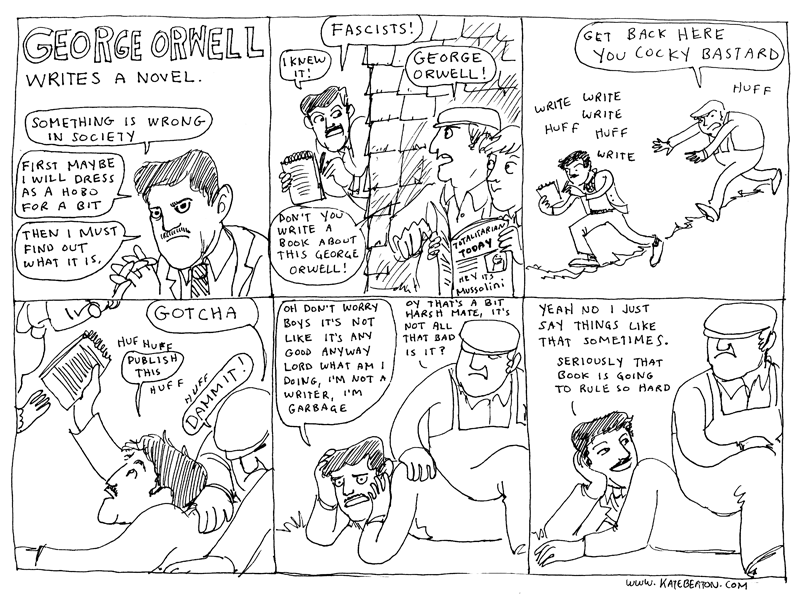
Colorized by Edvos. Date and photographer unknown. (Via Colorized History.)
Official website of the author

Colorized by Edvos. Date and photographer unknown. (Via Colorized History.)
New cover treatment for Orwell’s 1984 by David Pearson. See all five of Pearson’s designs for Penguin’s George Orwell series here. (A bit more information is here.) The last image, with the title entirely cut out, was Pearson’s initial concept, rejected by Penguin for cost reasons.
It is now 16 years since my first book was published, & abt 21 years since I started publishing articles in the magazines. Throughout that time there has literally been not one day in which I did not feel that I was idling, that I was behind with the current job, & that my total output was miserably small. Even at the periods when I was working 10 hours a day on a book, or turning out 4 or 5 articles a week, I have never been able to get away from this neurotic feeling, that I was wasting time. I can never get any sense of achievement out of the work that is actually in progress, because it always goes slower than I intend, & in any case I feel that a book or even an article does not exist until it is finished. But as soon as a book is finished, I begin, actually from the next day, worrying that the next one is not begun, & am haunted with the fear that there will never be a next one—that my impulse is exhausted for good & all. If I look back & count up the actual amount that I have written, then I see that my output has been respectable: but this does not reassure me, because it simply gives me the feeling that I once had an industriousness & a fertility which I have now lost.
— George Orwell, 1949 notebook entry (via)
The existence of good bad literature—the fact that one can be amused or excited or even moved by a book that one’s intellect simply refuses to take seriously—is a reminder that art is not the same thing as cerebration.
Read the whole essay here. See also: Orwell on Why I Write.
Two quotes pulled from Orwell’s classic 1940 essay on Charles Dickens.
Why is it that Tolstoy’s grasp seems to be so much larger than Dickens’s — why is it that he seems able to tell you so much more about yourself? It is not that he is more gifted, or even, in the last analysis, more intelligent. It is because he is writing about people who are growing. His characters are struggling to make their souls, whereas Dickens’s are already finished and perfect. In my own mind Dickens’s people are present far more often and far more vividly than Tolstoy’s, but always in a single unchangeable attitude, like pictures or pieces of furniture. You cannot hold an imaginary conversation with a Dickens character … because Dickens’s characters have no mental life. They say perfectly the thing that they have to say, but they cannot be conceived as talking about anything else.
And a little further on:
What people always demand of a popular novelist is that he shall write the same book over and over again, forgetting that a man who would write the same book twice could not even write it once.

Via. (Click image to view full size.)
All writers are vain, selfish, and lazy, and at the very bottom of their motives there lies a mystery. Writing a book is a horrible, exhausting struggle, like a long bout of some painful illness. One would never undertake such a thing if one were not driven on by some demon whom one can neither resist nor understand.
George Orwell, “Why I Write“